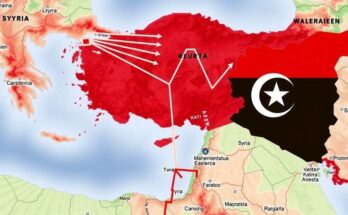Saudi Arabia and the UAE condemned Israel’s recent military strikes on Iranian military targets, perceiving them as violations of sovereignty and international law. This reaction follows Israel’s strikes after Iran’s missile attacks on Israel. Both nations stressed the necessity for restraint, dialogue, and adherence to international law to de-escalate mounting tensions. Other Middle Eastern countries, including Qatar, Oman, and Kuwait, also voiced their concerns regarding these military actions and their implications for regional peace.
Saudi Arabia and the United Arab Emirates (UAE), alongside various Middle Eastern nations, have unequivocally condemned Israel’s military strikes on Iranian targets, labeling them as violations of sovereignty and international law. Reports from Gulf News indicate that this reaction follows announcements from the Israel Defense Forces (IDF) asserting the execution of “precise strikes” against Iranian military positions, a month subsequent to Iran’s launch of approximately 200 ballistic missiles aimed at Israel. In a formal statement, the UAE expressed grave concern regarding the military actions targeting Iran, emphasizing the urgent necessity for restraint to prevent further escalation of hostilities that could jeopardize regional security and stability. The UAE’s Ministry of Foreign Affairs stated, “Exercising wisdom and avoiding actions that may expand the conflict are crucial at this time,” thus advocating for diplomatic dialogue and adherence to international law as primary avenues for resolving ongoing conflicts in the region. Similarly, Saudi Arabia reiterated its firm opposition to the exacerbation of conflicts that endanger regional peace. The Kingdom urged all involved parties to exercise maximum restraint and prioritize de-escalation efforts while warning of the dire repercussions stemming from ongoing military actions. Furthermore, it called upon the international community, as well as influential global actors, to assume their responsibilities in mitigating tensions and fostering an end to regional conflicts. The backdrop of this condemnation includes a violent timeline of events, particularly referencing the October 7, 2022, attacks by Hamas on Israeli communities, which resulted in substantial casualties—over 1,200 fatalities—along with the taking of hostages. Concurrently, local health officials in Gaza reported over 42,000 deaths resulting from Israel’s subsequent military operations. Additionally, Qatar, actively mediating in attempts to resolve the conflicts in Gaza, expressed deep apprehension regarding the potential repercussions of Israel’s escalatory actions. Oman and Kuwait similarly condemned Israel’s military maneuvers, with Oman stating that the strikes “fuel the cycle of violence and undermine efforts” towards de-escalation. Kuwait’s foreign ministry also condemned these actions, claiming they place regional security at risk.
The recent military actions by Israel against Iranian targets have ignited widespread condemnation from various nations in the Middle East, particularly Saudi Arabia and the UAE. This incident adds another layer of tension in a region already marked by conflict, especially following Iran’s earlier missile attacks on Israel. The responses from Gulf nations reflect deep concerns about sovereignty violations and the escalating cycle of military aggression, emphasizing the need for dialogue and diplomacy over confrontation. The ongoing instability in the region, highlighted by violent encounters and humanitarian crises, calls for international engagement to de-escalate existing conflicts and promote peace.
In conclusion, the military strikes conducted by Israel against Iranian targets have drawn strong rebukes from Saudi Arabia, the UAE, and other Middle Eastern nations, marking a significant moment in the ongoing tensions within the region. The calls for restraint and diplomacy underscore the critical need for dialogue to address the underlying conflicts that perpetuate violence and instability. Stakeholders across the globe are urged to actively engage in reducing tensions and fostering a framework for peaceful resolutions to the crises at hand.
Original Source: www.aninews.in




